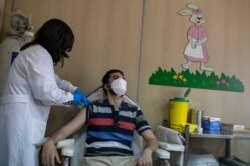The World Health Organization's Europe Regional Director Hans Kluge reported Thursday the number of new COVID-19 infections in the region dropped significantly in the last week for the first time in two months.
Speaking from WHO regional headquarters in Copenhagen, Kluge said hospitalizations and deaths were also down in the past week. He also said as of Thursday, 7% of Europeans have been totally vaccinated, more than the 5.5% of the population that has contracted COVID-19.
Kluge cautioned that while that is good news, the virus remains a threat, as infection rates remain high in several areas. He said individual and collective public health and social measures remain dominant factors in shaping the pandemic's course.
But he also noted that in those areas where high-risk groups such as health and other frontline workers were prioritized with vaccines, admissions to hospitals and death rates are falling.
Kluge said in the context of the pandemic, it is a combination of vaccines and strong public health measures that offer the clearest path back to normal.
But noting it is European Immunization Week, the WHO regional director said he wanted to send a message beyond COVID-19 and pressed the value of vaccines in general.
He said before the pandemic, vaccines had protected the world against life-threatening diseases for more than 200 years. While vaccines bring the world closer to ending the pandemic, he said they could also end measles, cervical cancer and other vaccine-preventable diseases.
He said when COVID-19 interrupted routine vaccine programs around the world, the results can be other severe infectious disease outbreaks just down the line. He urged public health systems to maintain routine primary health care while continuing to control the pandemic.
"Once again, vaccines are about to change the course of history — but only if we act responsibly and get vaccinated when offered the opportunity to do so," Kluge said.






